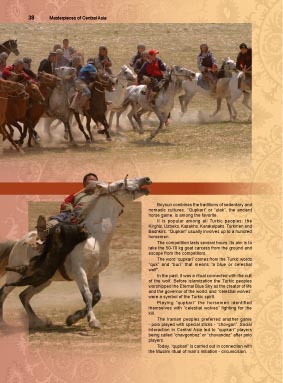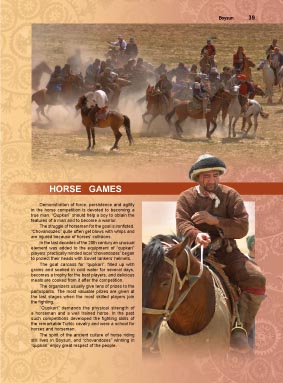Boysun combines the traditions of sedentary and nomadic cultures. “Qupkari” or “ulak”, the ancient horse game, is among the favorite. It is popular among all Turkic peoples: the Kirghiz, Uzbeks, Kazakhs, Karakalpaks, Turkmen and Bashkirs. “Qupkari” usually involves up to a hundred horsemen. The competition lasts several hours. Its aim is to take the 50-70 kg goat carcass from the ground and escape from the competitors.
![]()
Главная страница.
Статьи и доклады
Электронная библиотека
Космограммы Центральной Азии
Samarkand
(каталог на англ.яз.)
Boysun
(каталог на англ.яз.)
![]()
![]()
Boysun. Masterpieces of Central Asia
The word “qupkari” comes from the Turkic words “quk” and “buri” that means “a blue or celestial wolf”. In the past, it was a ritual connected with the cult of the wolf. Before islamization the Turkic peoples worshipped the Eternal Blue Sky as the creator of life and the governor of the world, and “celestial wolves” were a symbol of the Turkic spirit. Playing “qupkari” the horsemen identified themselves with “celestial wolves” fighting for the kill. The Iranian peoples preferred another game – polo played with special sticks – “chovgan”. Social interaction in Central Asia led to “qupkari” players being called “chavgonboz” or “chovandoz” after polo players.
Today, “qupkari” is carried out in connection with the Muslim ritual of man’s initiation – circumcision. Demonstration of force, persistence and agility in the horse competition is devoted to becoming a true man. “Qupkari” should help a boy to obtain the features of a man and to become a warrior. The struggle of horsemen for the goat is ironfisted. “Chovandozes” quite often get blows with whips and are injured because of horses’ collisions. In the last decades of the 20th century an unusual element was added to the equipment of “qupkari” players: practically minded local “chovandozes” began to protect their heads with Soviet tankers’ helmets. The goat carcass for “qupkari”, filled up with grains and soaked in cold water for several days, becomes a trophy for the best players, and delicious meals are cooked from it after the competition. The organizers usually give tens of prizes to the participants. The most valuable prizes are given at the last stages when the most skilled players join the fighting. “Qupkari” demands the physical strength of a horseman and a well trained horse. In the past such competitions developed the fighting skills of the remarkable Turkic cavalry and were a school for horses and horsemen. The spirit of the ancient culture of horse riding still lives in Boysun, and “chovandozes” winning in “qupkari” enjoy great respect of the people.

